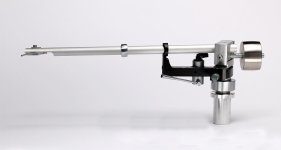There are companies that dampen aluminium arm tubes with carbon fibre (Project). What, if any benefits, would adding a tiny rubber ring or two (o ring seal) around an alu tonearm tube (Technics SL100C) bring? Would it simply shift the resonances slightly to another frequency or actually dampen the arm? It would add a small amount of weight, perhaps half a gram. Thanks
Hi,
A lot of companies did some damping on tonearms:
SME put Balsa wood into the tonearm wands of SME 3009/2 and 3012/2
Latest Ortofon tonearms like the TA-110 (made in Japan) have some rubber inside, and they sound much cleaner than the older Ortofon tonearms.
So it might be natural that some damping is recommended. Johnathan Carr (of Lyra cartridges) onces said, the Fidelity Research FR-64S need a shrink wrap on the outside to dampen its tube resonances.
If you have something soft, then it can actually damp vibrations in full frequency range.
But if you have some hard materials tied together, e.g. like a stainless steel tube glued inside an aluminium tube, then there will be only vibrations left, which are at the same frequency in both materials.
Some modern highly priced tonearms have this, like the Einstein tonearm or the Acoustical Systems tonearms.
As you can easily put a rubber band or ring around a tonearm wand, just try it, and report back,
best regards
Hartmut
A lot of companies did some damping on tonearms:
SME put Balsa wood into the tonearm wands of SME 3009/2 and 3012/2
Latest Ortofon tonearms like the TA-110 (made in Japan) have some rubber inside, and they sound much cleaner than the older Ortofon tonearms.
So it might be natural that some damping is recommended. Johnathan Carr (of Lyra cartridges) onces said, the Fidelity Research FR-64S need a shrink wrap on the outside to dampen its tube resonances.
If you have something soft, then it can actually damp vibrations in full frequency range.
But if you have some hard materials tied together, e.g. like a stainless steel tube glued inside an aluminium tube, then there will be only vibrations left, which are at the same frequency in both materials.
Some modern highly priced tonearms have this, like the Einstein tonearm or the Acoustical Systems tonearms.
As you can easily put a rubber band or ring around a tonearm wand, just try it, and report back,
best regards
Hartmut
You can try a layer of felt covered by a thin layer of adhesive tape. Will do wonders, without adding much weight or its own resonances.
Most MC cartridges dump a lot of vibrations into the arm and the chassis, especially the Denon DL-103. This can be easily felt by lightly touching the arm tube while it's playing.
Long ago, I mentioned this to a friend who promptly got a 1st aid kit out and, being a MD, did a professional bandage job on the arm with great success 🙂
Long ago, I mentioned this to a friend who promptly got a 1st aid kit out and, being a MD, did a professional bandage job on the arm with great success 🙂
Thank you all. I've figured if tube dampers, essentially o rings, help with valve resonances it may also help with a tone arm.
Most MC cartridges dump a lot of vibrations into the arm and the chassis, especially the Denon DL-103. This can be easily felt by lightly touching the arm tube while it's playing.
Long ago, I mentioned this to a friend who promptly got a 1st aid kit out and, being a MD, did a professional bandage job on the arm with great success 🙂
Damping, only very carefully and in easily reversible steps. It often does more harm than good. The balsa wood inside the SME tubes is a good example of what constitutes a reasonable amount of damping.
The cling film on the outside of the tube is very easy to try and imho has disastrous sonic effects. The tiny, strategically placed rings are perhaps a much better idea. Fwiw, never liked the sound of the FR-64 and the cling film certainly did not make it better.
Excess damping isn't a bad thing here, you don't want the arm vibrating at all really. But you don't want to add much mass either.
Valve bodies vibrate in a different mode to tonearms, so the rubber ring which damps oval-circle-oval modes isn't very appropriate - the tonearm vibrates like a long bar (because it is a long bar), so you need to damp that flexing mode primarily.
Shrink-wrap tubing along it might be worth trying (if you can protect the rest of the system from heat, and remove it again without scratching the arm - best done on a scratch tone-arm really, or a piece of metal tube as experiment). or simply wrap some rubber band around it in a helix? Rubber is excellent for damping.
I wonder if a powder-coated tone arm would work well?
Valve bodies vibrate in a different mode to tonearms, so the rubber ring which damps oval-circle-oval modes isn't very appropriate - the tonearm vibrates like a long bar (because it is a long bar), so you need to damp that flexing mode primarily.
Shrink-wrap tubing along it might be worth trying (if you can protect the rest of the system from heat, and remove it again without scratching the arm - best done on a scratch tone-arm really, or a piece of metal tube as experiment). or simply wrap some rubber band around it in a helix? Rubber is excellent for damping.
I wonder if a powder-coated tone arm would work well?
- Home
- Design & Build
- Construction Tips
- Tonearm damping
